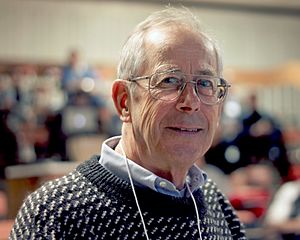Jim Peebles facts for kids
Quick facts for kids
Jim Peebles
|
|
|---|---|

Peebles in 2010
|
|
| Born |
Phillip James Edwin Peebles
April 25, 1935 |
| Nationality | Canadian, American |
| Education | University of Manitoba (BS) Princeton University (MS, PhD) |
| Known for | Cosmic microwave background radiation Cosmic infrared background Cold dark matter Lyman-alpha emitter Primordial isocurvature baryon model Quintessence Recombination Ostriker–Peebles criterion |
| Spouse(s) |
Alison Peebles
(m. 1958) |
| Children | 3 |
| Awards | Eddington Medal (1981) Heineman Prize (1982) Bruce Medal (1995) Gold Medal of the Royal Astronomical Society (1998) Gruber Prize (2000) Harvey Prize (2001) Shaw Prize (2004) Crafoord Prize (2005) Dirac Medal (2013) Order of Manitoba (2017) Nobel Prize in Physics (2019) |
| Scientific career | |
| Fields | Theoretical physics Physical cosmology |
| Institutions | Princeton University Institute for Advanced Study |
| Thesis | Observational tests and theoretical problems relating to the conjecture that the strength of the electromagnetic interaction may be variable (1962) |
| Doctoral advisor | Robert Dicke |
| Doctoral students |
|
Phillip James Edwin Peebles (born April 25, 1935) is a famous Canadian-American astrophysicist. He is also an astronomer and a theoretical cosmologist. This means he studies the universe and how it began. He used to be a professor at Princeton University. Many people think he is one of the most important scientists studying the universe since 1970.
Peebles made big discoveries about how the universe works. He helped us understand things like dark matter and the cosmic microwave background. These are important parts of how the universe formed.
In 2019, Peebles won half of the Nobel Prize in Physics. He received it for his ideas about the universe's history. The other half of the prize went to Michel Mayor and Didier Queloz. They won for finding a planet outside our solar system. Peebles' work focuses on the universe's early moments. However, he is careful about claiming to know exactly how it all began.
Early Life and Education
Jim Peebles was born on April 25, 1935. His birthplace was St. Vital, which is now part of Winnipeg, Manitoba, Canada. His mother, Ada Marion Green, was a homemaker. His father, Andrew Charles Peebles, worked at the Winnipeg Grain Exchange.
Peebles went to the University of Manitoba. There, he earned his first science degree. After that, he went to Princeton University for more studies. He received his PhD in physics in 1962. His main teacher was Robert Dicke. Peebles stayed at Princeton for his entire career. He also visited the Institute for Advanced Study several times.
Academic Career and Discoveries
Since 1964, most of Peebles' work has been in physical cosmology. This field tries to figure out how the universe began. In 1964, not many scientists were interested in this area. But Peebles kept studying it.
Peebles has made many important contributions to the Big Bang model. This model explains how the universe started. With his teacher Robert Dicke and others, Peebles predicted the cosmic microwave background radiation. This is like an echo from the early universe. He also helped us understand dark matter and dark energy. He was a leader in explaining how galaxies and other structures formed in the universe.
Peebles helped make cosmology a respected science. He said that the discovery of the cosmic microwave background was very important. It made many scientists want to study the universe. His work helped turn cosmology from a guess-filled field into a precise science.
Peebles often came up with new ideas that other scientists later studied. For example, in 1987, he suggested a model for the early universe. He also helped define the problem of dark matter in the 1970s. Peebles is also known for the Ostriker–Peebles criterion. This idea helps explain how galaxies stay stable.
His many discoveries led to him winning the Nobel Prize in Physics in 2019. He was also elected to important groups. These include the American Academy of Arts and Sciences in 1977. He also joined the National Academy of Sciences in 1988.
Awards and Recognition
Jim Peebles has received many awards for his work. These honors show how important his contributions are to science.
- Eddington Medal (1981)
- Heineman Prize (1982)
- Fellow of the Royal Society (1982)
- Henry Norris Russell Lectureship (1993)
- Bruce Medal (1995)
- Gold Medal of the Royal Astronomical Society (1998)
- Gruber Prize in Cosmology (2000)
- Harvey Prize (2001)
- Shaw Prize (2004)
- Crafoord Prize (2005)
- Dirac Medal (2013)
- Member of the Order of Manitoba (2017)
- Nobel Prize in Physics (2019)
An Asteroid is also named after him: 18242 Peebles.
See also
 In Spanish: James Peebles para niños
In Spanish: James Peebles para niños
 | Stephanie Wilson |
 | Charles Bolden |
 | Ronald McNair |
 | Frederick D. Gregory |

